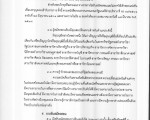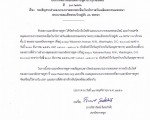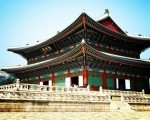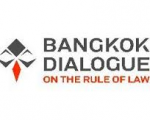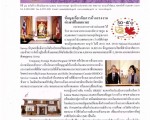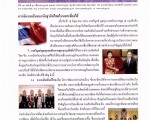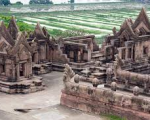
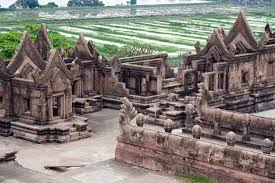 The leaders of Thailand and Cambodia pledged to maintain friendly relations and move forward following a ruling by the International Court of Justice last week concerning land surrounding the Phra Viharn temple – also known as Preah Vihear. Representatives of both countries said that their side had gained from the court’s decision, which was still being interpreted by diplomatic and legal teams in each land.
The leaders of Thailand and Cambodia pledged to maintain friendly relations and move forward following a ruling by the International Court of Justice last week concerning land surrounding the Phra Viharn temple – also known as Preah Vihear. Representatives of both countries said that their side had gained from the court’s decision, which was still being interpreted by diplomatic and legal teams in each land.
Prime Minister Yingluck Shinawatra announced that her government would set up a committee to work with Cambodia to implement the court’s ruling and find solutions that would benefit both countries to any problems that may remain. “As ASEAN (Association of Southeast Asian Nations) members, we have to rely on each other for prosperity,” the Prime Minister said, noting that the neighbors share an 800-kilometer-long border.
“Thailand and Cambodia have to hold talks under the existing mechanism to settle the dispute and seek mutually acceptable solution,” she said in a nationally televised press conference. She also asked all Thais to be confident that the government would be at its best in protecting national interests.
Peace along the border would open up more possibilities for bilateral trade, investment and tourism as adjacent regions in both countries are home to many ancient temples that have rarely been visited because the area is relatively undeveloped.
Reading out the judgment at The Hague, Peter Tomka, president of the ICJ, said the court had decided “that Cambodia had sovereignty over the whole territory of the promontory of Preah Vihear.” The promontory, however, is a small part of the 4.6-square kilometer area that is claimed by both countries. The ICJdid not rule on which country owned the rest of the disputed land, and encouraged both nations to enter into a dialogue to resolve the issues.
Preah Vihear, known as Phra Viharn in Thailand, is an 11th-century Hindu temple that sits on the border between the two countries and has been proposed as a UNESCO World Heritage Site. In a 1962 decision, the court awarded the temple to Cambodia based on a map from over 100 years ago drawn by France, which had colonized Cambodia and had been threatening Thailand, then known as Siam. Thailand has argued that it never accepted the map, but the court ruled that a lack of an official protest is de facto acceptance.
Following clashes in over the disputed area in 2011, Cambodia asked the ICJ to reinterpret the 1962 decision to confirm its sovereignty over the temple and also the disputed territory.
- On 21 November 2013, H.E. Mr.Vijavat Isarabhakdi, Ambassador of Thailand to the United States of America, gave his speech at the Welcoming Luncheon organized by U.S – ASEAN Business Council
- Royal Thai Embassy hosted Fulbright Association Reception on 22 November 2013
- Prime Minister Yingluck Shinawatra’s televised statement on current political situation in Thailand on 25 November 2013
- On 25 November 2013, H.E. Mr.Vijavat Isarabhakdi, Ambassador of Thailand to the United States of America, delivered speech at the U.S. Chamber of Commerce
- ประชาสัมพันธ์ประกาศรับสมัครสอบแข่งขันตำแหน่งนักการทูต 2557
1076
views

Royal Thai Embassy hosted Fulbright Association Reception on 22 November 2013
นายวิชาวัฒน์ อิศรภักดี เอกอัครราชทูตไทยประจำสหรัฐอเมริกา เป็...

Silicon Valley start-up accelerator expands to Thailand
The Founder Institute, a Silicon Valley-based technology sta...

Facebook Chat What's the Plus in Erasmus+?
On Monday 9 December the European Commission will be hostin...

Thai firms to invest $2 billion in solar power
Thailand is poised for a solar energy boom as private compan...

Thailand extradites five drug suspects to the United States
Thai authorities extradited five suspected international dru...

Second Round of Programme Representative Elections
If you missed the opportunity to nominate yourself for the P...

Update on the Elections for Programme Representatives!
Check out the first Programme Representatives and the ongoin...

เรียนฟรี กับกิจกรรม styling your space ที่ dii school
Interior Decorator Stylist Workshop สำหรับท่านที่สนใจอาชีพ ...

Board of Trade joins with fishing groups to fight labor abuse
Thailand’s Board of Trade has come on board with eight fishi...

University of Leicester มอบทุนการศึกษาในระดับปริญญาเอก สาขาวิศวกรรมศาสตร์ ที่ประเทศอังกฤษ
สวัสดีจ้าเพื่อน ๆ วันนี้ก็มาชมข่าวเกี่ยวกับทุนการศึกษาจากต่า...

University of Sussex มอบทุนการศึกษาในระดับปริญญาเอก ให้กับนักศึกษาต่างชาติ ปี 2557 นี้
ทุนการศึกษาถัดไปที่น่าสนใจของวันนี้ ที่ ScholarShip.in.th นำ...

20ทุนไทยพัฒน์ รัฐบาลให้ไปเรียนต่อต่างประเทศ ระดับปริญญาโท-เอก
สำนักงาน ก.พ. ได้รับพระมหากรุณาธิคุณจากพระบาทสมเด็จพระเจ้าอย...

ทุนมูลนิธิการศึกษาไทย-อเมริกัน (ฟุลไบรท์) ประจำภาคฤดูร้อน 2557
สถานทูตอเมริกันประจำประเทศไทย ร่วมกับมูลนิธิการศึกษาไทย-อเมร...

University of Strathclyde มอบทุนการศึกษาในระดับปริญญาตรี ให้กับนักศึกษาชาวต่างชาติ ในทุก ๆ สาขาวิชา
มาชมทุนการศึกษาต่อไปของวันนี้ ScholarShip.in.th นำมาฝากเพื่อ...

QBM มอบทุนปริญญาเอกเต็มจำนวน ศึกษาต่อประเทศเยอรมนี
The Graduate School of Quantitative Biosciences Munich (QBM)...

ผู้ช่วยเจ้าอาวาสวัดบวรฯ เผย "พระเกศา-พระโลหิต" พระสังฆราชกลายเป็นพระธาตุ
เมื่อวันที่ 10 ธันวาคม ที่วัดบวรนิเวศวิหาร พระราชรัตนมงคล ...


